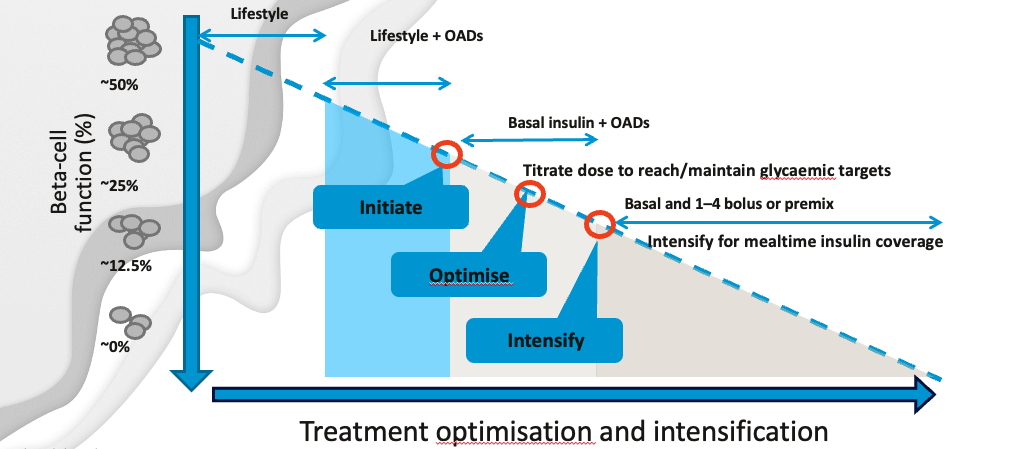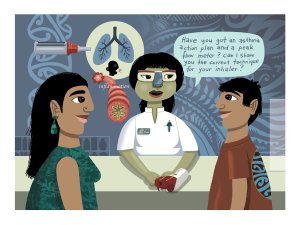Academic pharmacist Nataly Martini discusses the medical management of asthma in adults and adolescents, which has evolved to prioritise early anti-inflammatory treatment. She also explains how to improve patient outcomes by proactively identifying poor asthma control and supporting equitable access to education and treatment
Webinar: Insulin therapy for patients with type 2 diabetes
Webinar: Insulin therapy for patients with type 2 diabetes

This webinar updates viewers on individualised insulin therapy for patients with type 2 diabetes. It is the second in a series of webinars on the management of diabetes, brought to you with the support of Sanofi
This activity has been endorsed by the Pharmaceutical Society of New Zealand as suitable for inclusion in a pharmacist’s continuing education records for continuing professional development purposes. You can record details of this webinar on the “Keeping up to date” page of your portfolio on MyRecert (myrecert.pharmacycouncil.org.nz).
This webinar is presented by associate professor Gary Kilov and has the following learning objectives:
- Discuss why insulin therapy is required, with respect to the complex pathophysiology of type 2 diabetes
- Identify benefits of insulin therapy for patients with type 2 diabetes
- Discuss insulin initiation, titration and intensification to maintain glycaemic control in patients with type 2 diabetes
- Describe factors to consider when selecting an insulin therapy
- Identify strategies to intensify insulin therapy with or without other therapies
After you have watched this presentation, you may complete the assessment below to test your understanding of the topic.
Remember, you can also use the Capture button below to record your time spent watching.
This is the second webinar in a series on the management of diabetes.
Watch the first webinar in this series: Update on interventions to improve glycaemic control in type 2 diabetes
Watch the third webinar in this series: Practical management for patients with diabetes
Watch the fourth webinar in this series: Intensifying insulin therapy for people with type 2 diabetes
This seven-question multiple-choice assessment is designed to demonstrate that the webinar has been effective in allowing you to meet the learning objectives of this course. Write down your answers to these questions.
1. What are TWO reasons why insulin is eventually required in many patients with type 2 diabetes?
a. At diagnosis, 50% of beta cell function is lost, and there is eventual loss of the majority of insulin producing capacity
b. Insulin resistance progresses throughout life
c. Patients develop a tolerance to non-insulin therapies
d. Secondary failure of non-insulin therapies is common
2. What are TWO benefits of insulin therapy for type 2 diabetes?
a. Insulin can be introduced at any stage of a patient’s type 2 diabetes trajectory
b. Insulin can stop the progression of type 2 diabetes
c. Insulin is a “set and forget” solution to type 2 diabetes
d. Insulin offers cardio-renal protection
e. There is no maximal dose of insulin
3. Which TWO of the following statements regarding the initiation of insulin therapy are correct?
a. Patients should be commenced on insulin if they are non-adherent to lifestyle and non-insulin therapies
b. Insulin should be commenced if HbA1c remains above target despite optimising non-insulin therapies
c. It is important to exclude secondary causes of hyperglycaemia, such as sepsis, before starting insulin
d. Non-insulin diabetes medications must be ceased before insulin initiation
4. Which TWO of the following statements regarding the early initiation of insulin therapy are correct?
a. Insulin should be initiated early to avoid patients spending time with damaging levels of hyperglycaemia
b. Insulin should not be initiated early; it is a last resort medication for type 2 diabetes
c. Insulin therapy is simpler and safer when initiated early
d. Insulin that is initiated early also requires early intensification because glycaemic control is not maintained
e. Early initiation of insulin avoids the need to intensify therapy later
5. Which statement regarding the selection of insulin regimens is correct?
a. All patients should be commenced on basal insulin because it requires less blood glucose monitoring
b. Basal insulin intensified to basal-plus regimens has the best chance of success for patients with low health literacy
c. Insulin regimens should be individualised according to patient preferences, abilities and desires
d. More complex insulin regimens should be avoided because they lead to higher rates of hypoglycaemia
e. Premix insulin should be reserved for older patients because it is more likely to require prompt intensification
6. When comparing basal insulin versus premix insulin, which TWO of the following are correct? For a given baseline HbA1c:
a. premix insulin requires a higher dose than basal insulin
b. there are similar rates of hypoglycaemia with basal and premix insulins
c. there is more weight gain with basal insulin than premix insulin
d. there is similar glycaemic control with basal and premix insulins
7. What are FOUR possible options for intensifying insulin therapy?
a. Add doses of rapid-acting insulin to basal insulin or use multiple doses of premix insulin
b. Continue to increase the dose of basal insulin at night to help correct daytime hyperglycaemia
c. Metabolic surgery for those who are highly insulin resistant
d. Reduce carbohydrate intake
e. Skip the evening or morning meal, depending on when the basal insulin is taken
f. Use non-insulin pharmacotherapy
Write down your answers to these questions. Then, to check your answers and record your score, click here.





